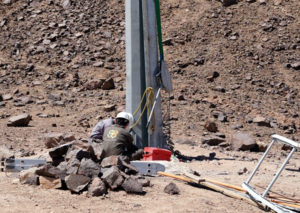
This project develops the first renewable energy-based smart microgrid that involves the community in the efficient use of energy and the system operation. Its main objective is to provide the town of Huatacondo, in the region of Tarapacá, with electricity 24 hours a day thanks to the use of renewable energies.
Some of its most remarkable features are the innovations and peculiarities of the Huatacondo facilities, considering the relation with the community, the town’s electric, communication and geographical isolation, as well as the use of natural sources for the generation of renewable energy.
Currently, this Project has reached 60% of renewable penetration based on the following combination:
- 22.68 [kW] Main photovoltaic plant with one axis tracking.
- 120 [kVA] Diesel group.
- 129 [kWh] Energy storage system.
The project’s social intervention has taken into account the direct involvement of the community in the decision-making processes, empowering people and turning them into operators while giving them responsibilities over efficient use of energy and minor maintenance.
This project breaks the barrier of taking cutting-edge technology to small towns afar from big cities, thus generating efficient solutions that can be replicated in different spots of electric distribution. This process strengthens and stabilizes isolated and interconnected electricity systems.
Microgrid Description
Huatacondo has an electricity network that is isolated from the interconnected system and originally supplied electricity for only ten hours a day, using a diesel generator. The project consists of a microgrid that takes advantage of the area's particularly abundant renewable resources to provide 24-hour electricity.
Since the village has also experienced problems with its water supply system, the project design included a component to manage that resource. Furthermore, to compensate for generation fluctuations due to the use of renewable energy sources, a demand-side component was included in the system.